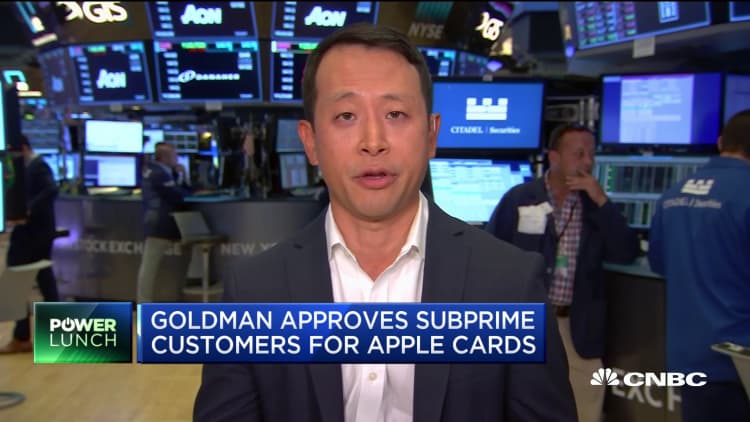Goldman Sachs may get stung by rising loan losses on the Apple Card in the next economic downturn, according to Nomura analysts.
The much-hyped credit card, which Goldman began to make available last week, has no fees, the industry's lowest interest rate range for comparable cards, and a mandate to approve as many iPhone users as possible, according to a report Wednesday from analysts led by Bill Carcache.
That leads Carcache to one conclusion: "The Apple Card portfolio may generate lower revenues and face higher loss content relative to the industry average."
In his analysis, which assumes that Goldman spends $350 to acquire each new user, the bank will begin to break even on a customer after four years.
The problem is, the U.S. economy might stall before that. A widely watched bond market metric is flashing a recession warning amid a global economic slowdown, and bank stocks were hammered Wednesday on the prospect of rising loan losses and tighter profit margins. Recessions typically occur an average of 22 months after the yield curve inverts on 2- and 10-year Treasurys, according to Credit Suisse.
Goldman's product is "highly sensitive" to rising net charge offs, and the bank will begin to lose money if losses reach about 8%, Carcache said. In the last recession, net charge offs surged in 2008 and peaked at above 10% in 2010. Goldman declined to comment on the research note.

Making matters worse, issuers typically experience peak losses on credit card loans after about two years of origination, and Carcache expects the bank's portfolio to face "outsized headwinds" in that period.
"As a new entrant, Goldman Sachs does not have the historical data or experience that lenders obtain when underwriting through a credit cycle," Carcache's note said. "By definition, credit businesses are cyclical, and we would expect Goldman Sachs to face its fair share of volatility in the next recession."
Over time, losses will probably settle to somewhere in between the card portfolios of Capital One and Discovery Financial, he added, citing press reports that Goldman is lending to subprime customers. CNBC reported last week that Goldman is casting a wide net for Apple Card customers, approving some subprime borrowers for the product.
The tech giant and Goldman might offer a debit card next, the analyst wrote. The bank could do that because customers will likely pay off their Apple Card balances via bank accounts, meaning Goldman will have users' account and routing numbers stored. Debit cards generated $15 billion in revenues for banks last year.
— With reporting from CNBC's Michael Bloom.
Read next: A Goldman Sachs rival pulled out of the Apple Card deal on fears it will be a money loser


